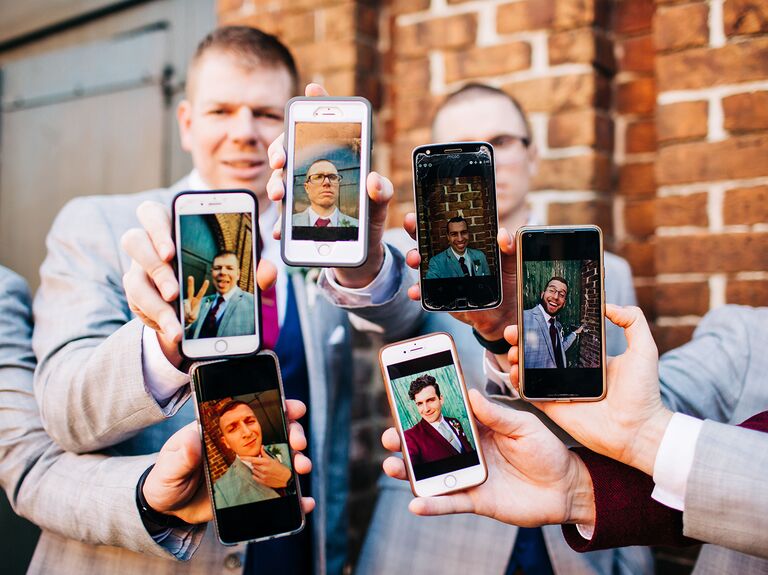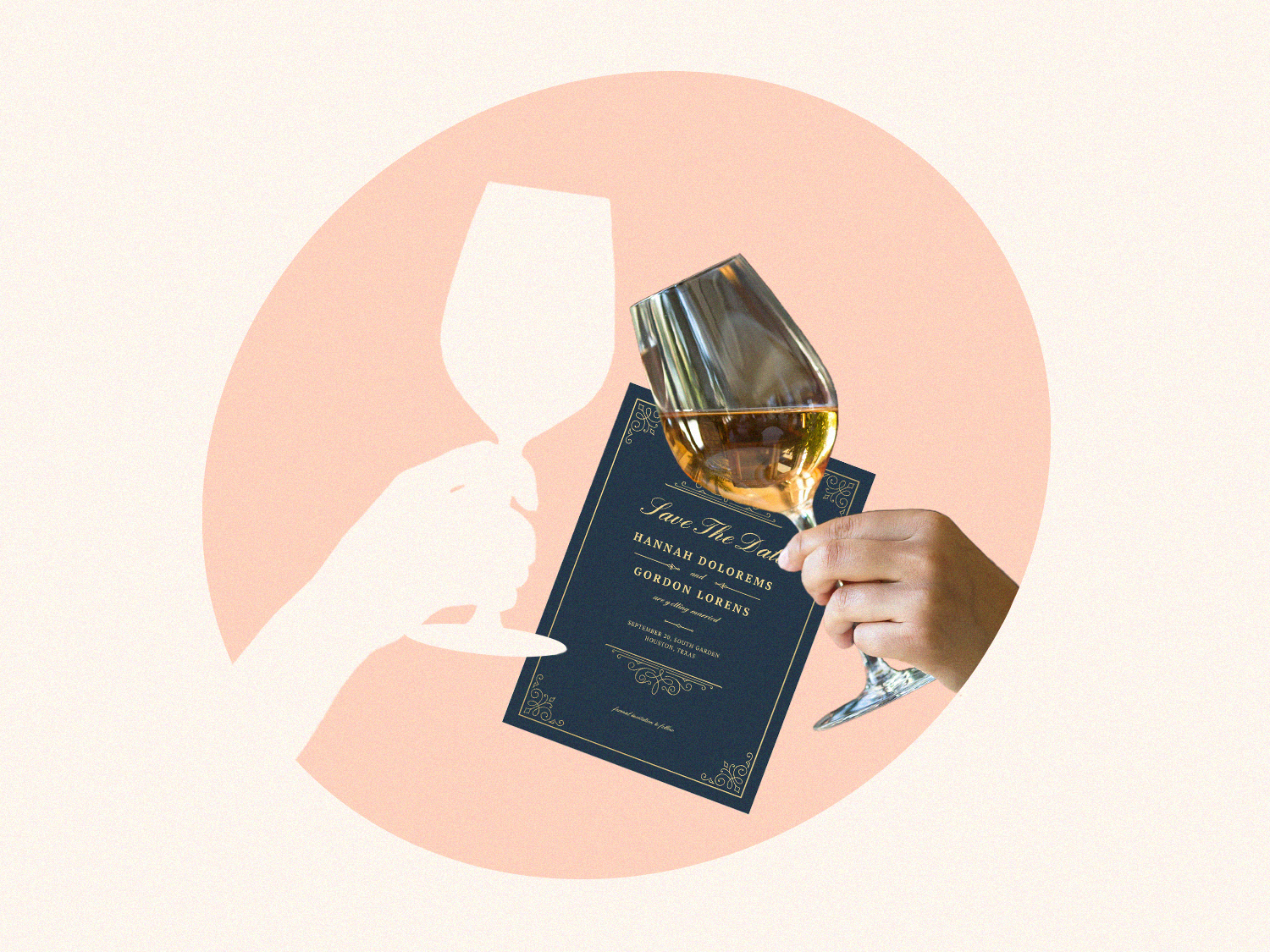How to Announce Your Wedding on Social Media the *Right* Way
Whether you're engaged or freshly married, gushing over your (upcoming or past) celebration is easy face to face, but planning how to announce your wedding on social media is a totally different story. And yes, we know social media makes it easy for you to share every step of the planning journey and wedding with everyone, but that doesn't mean you should. Learn from two of our favorite wedding content creators when's the best time to post, if you can tell guests to ditch their phones on your wedding website, tag etiquette and more. Remember, you can share your wedding content however you choose, but it doesn't hurt to know how to navigate the process.
1. There's No Deadline for Posting Your Wedding on Social Media
"There are no hard, set rules for when or how to share wedding photos. The beauty of social media is that we all use it differently. I've worked with couples doing a live takeover of their social media, where I post on their stories and in-feed on their account during their wedding. I also have couples who never post about their wedding online, preferring to keep their gallery completely private," Lauren Ladouceur, passionate wedding content creator and founder of Plan With Laur, tells us.
2. Consider Using a Wedding Hashtag
Coming up with wedding hashtags is one of the fun parts of wedding planning. And it's a great way for friends and family to share photos on or after the celebration. But that doesn't mean every picture you post leading to the event needs your wedding hashtag attached. We advise only using it for your wedding-related events, so you (and your followers) don't get tired of seeing it too quickly.
3. Don't Let Anyone Tell You've Posted Your Wedding Too Much
"The limit does not exist. Of course, you don't want to post constantly but sprinkle wedding pictures in your content. We want to see you with your bridal party for a post, the details for another, you and your partner together and then how the party turned out," Maddie Cheatham, founder of Shooting Starr Social with three years of wedding content creation experience, suggests. Ladouceur agrees and adds, "Your wedding is beautiful and exciting, and you typically spend a bunch of time (and money) planning it. Posting about your wedding is the perfect coda to a special, one-of-a-kind chapter in your life."
4. Check With Loved Ones Before Tagging Them
Whether you're announcing your wedding on social media, posting about your bach trip or showing off your favorite couple's shower moments, you should always check in with the people in the photo you're about to post before it goes live. Remember, not everyone wants their face all over Instagram, Facebook and TikTok. So, no matter how flattering you look, you should send a quick text to whoever's in the picture to ensure they're okay with being tagged. (Psst. This is crucial when preparing to post bach party pictures––some pictures should stay hidden from the public eye.)
5. It's Okay to Let Guests Know You Don't Want Them to Post Your Event
Wondering how to communicate with wedding guests that you'd rather them not post on your wedding day? There are four ways you can go about this. Cheatham suggests including this unplugged wedding request on your invitations or displaying a sign at the event. Ladouceur advises couples to let guests know by addressing it on their wedding website and "to reach out directly or have a loved one intercede discreetly on your behalf if you're worried that a particular guest might overstep and overshare."
6. Keep Videos Short and Sweet
There are a lot of beautiful moments that can happen before, during and after the wedding, but that doesn't mean you need to include all of them in your video. Try to stick to 90 seconds (Instagram's max time limit) on all your socials so your followers don't feel overwhelmed by the content you're uploading. If you have a wedding video you want to share, send it to close friends and family directly or link to the long-form video in your bio or video highlights post.
7. Show Appreciate for Your Vendors
One of the many ways you can thank your pros is by tagging them on your wedding content. Cheatham believes showcasing your vendors in at least the first photo and video you post is crucial. "Your vendors absolutely love it when you tag them and share their work. This means more work for them later on. You're the best influencer we need because people trust you and trust who you hire. Also, vendors love seeing your love. We can't wait to like, share and comment away," Cheatham says.
8. Avoid Counting Down From Your Wedding
While posting a status every day before your wedding with how many days are left is a bit overkill, we think sharing countdown captions here is totally fine. But after you've said "I do," try waiting for those milestone anniversaries to upload cute selfies of you and your new spouse. You may get a few unfollows or unfriends if you keep posting photos every month since you became official.
9. Know When It's the Best to Post on the Wedding Day
You might be surprised, but Cheatham says there are social media etiquette guests and to-be-weds should follow on the wedding day. Number one: "Don't post the wedding dress until after the ceremony. You don't want to spoil the surprise." Number two: "Post on your stories and tag the couple so they can see how much fun you had." Number three: "Don't use your phone during the ceremony, especially in the middle of the aisle, unless told to use them."
10. Use Your Wedding Post to Tell Everyone Thank You
When you're announcing your wedding on social media, you might feel overwhelmed looking through so many wedding caption options. If you can't find the one that fits your vibe, consider taking the simple route. Use your caption to express your love and appreciation for everyone who could attend your memorable day.
11. Hire a Wedding Content Creator to Help You
Want someone else to carry the load of posting your wedding imagery? That's where wedding content creators come in. "If sharing your wedding on social media is important to you, hire a wedding content creator. They can help you craft photo and video content from your wedding and thoughtfully share as much (or as little) content with your community online," Ladouceur says.
























